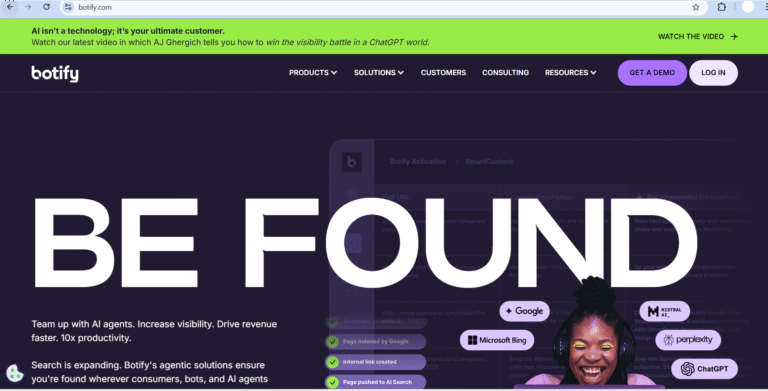Table of Contents
Introduction to Botify
This article is a detailed review of Botify, aimed at examining the Botify scam claims and giving you a clear Botify review to decide whether is Botify a scam or a trustworthy project. Botify (or Botify.cloud) bills itself as a platform combining blockchain, AI, and no-code automation agents. It offers an “agent marketplace,” allowing users to create, deploy, and monetize AI agents (“bots”) for tasks like trading, social media management, volume management, and other utilities. There is also a native token (“$BOTIFY”) that powers transactions, staking, revenue sharing, etc. It appears to operate on the Solana blockchain, with an ecosystem of certified agents.
If you’ve been scammed by Botify already and want real information about whether this platform is legit or not, or if you are considering putting in time or money and are suspecting Botify might be unsafe, this article is for you. We’ll address the frustrations, doubts, and anger many feel. This Botify review uncovers all the warning signs you need to know.
Botify: Regulation & Legal Status
Before trusting any platform, especially those involving tokens and promises of passive income, regulation and legal standing are key—especially to know whether Botify is a fraud or merely unregulated.
- There is no public evidence that Botify is regulated as a financial broker by major authorities like the UK’s FCA, Australia’s ASIC, or the EU’s CySEC. Searches of their websites and regulatory registries do not show Botify as a licensed trading broker in traditional CFD/forex markets.
- Botify is described more as a blockchain / AI automation / token ecosystem (no-code agents, revenue sharing) rather than offering standard financial services regulated under securities laws. Because token-based projects often fall into regulatory grey areas, this increases risk.
- Some portions of Botify’s own documentation emphasize blockchain integration, decentralization, certified agents, revenue sharing, etc., which may imply financial benefits or returns. If so, this could trigger regulation in many jurisdictions if those benefits are treated like investments or securities.
Risks of unregulated or lightly regulated platforms include:
- Lack of legal recourse if things go wrong (e.g. you cannot withdraw, or platform fails).
- Possible misrepresentation of profit or return potential.
- Weak or no oversight, which may lead to unfair or opaque rules.
If you want to see formal tools or checks on legitimacy, use resources like [Scam-Detector’s validator] or check local securities / financial regulator listings. The lack of strong oversight raises serious questions about whether Botify is a scam.
Trading Conditions & Platform Analysis of Botify
Because Botify is not exactly a broker (i.e. it does not seem to offer standard CFD/forex accounts with leverage, MT4/MT5, etc.), we need to examine what its token-/agent-based model promises, and where there are missing or worrying details.
| Feature | What Botify Claims / Offers | What Is Unclear / Possible Red Flags |
|---|---|---|
| Native Token & Utility | Botify provides a native token ($BOTIFY) used in purchases, governance, staking, etc. It claims revenue sharing with token holders. (Gate article ) Gate.com | It is not always clear how stable or realistic the revenue distribution is. Terms like “passive income” are sometimes used without detailed audited proofs of how much revenue is shared, how frequently, and whether performance matches promises. |
| Agent Marketplace & Features | Offers a marketplace of certified AI agents (bots) that users can deploy for various tasks. No-code approach, ease of use, tools for non-technical users. botify.cloud+1 | What is less clear is the performance of these agents (especially trading ones), the risks involved, how losses are handled, whether there’s oversight or guarantee, the fees, how the profit‐sharing is calculated exactly, minimum thresholds, etc. |
| Blockchain & Security | Botify uses Solana, claims transparent transactions, payments via SOL or $BOTIFY tokens for many operations. CoinMarketCap+1 | The security posture is only partially visible; e.g., whether smart contracts have undergone audits, how secure the platform is against hacks or vulnerabilities. Also, volatility of token price can dramatically affect returns. |
| Promises & Marketing | The platform is marketed as democratizing AI automation, offering tools for passive income, revenue sharing, etc. These are attractive promises. Gate.com+2botify.cloud+2 | Promises can be vague or optimistic. Terms like “monetize your bot,” “earn rewards,” or “passive income” often lack clarity about risk, minimum participation, or costs. Sometimes there may be fine print or high fees, which are not always obvious upfront. |
Useful anchor: What to check before signing up with a platform that promises returns, rewards, or token-based profit models. These gaps in transparency (especially around revenue share, audits, performance, and withdrawal conditions) make it harder to dismiss the idea that Botify might be a fraud.
Reputation & User Reviews About Botify
Here is what public data and user feedback suggest — both positive signs and concerning patterns.
- On CoinMarketCap / “CMC AI”, the description of BOTIFY states that the platform aims to allow non-technical users to build and monetize no-code bots, has tokenized ecosystem, etc. CoinMarketCap
- On “Gate.com / All About BOTIFY Token”, there is information about the tokenomics, use cases, and project road map. This suggests at least some level of maturity and transparency in marketing. Gate.com
- On the revenue-sharing / marketplace side (Botify.cloud), the platform claims many benefits: certified agents, passive rewards, etc. botify.cloud
- User reviews: We found little or no credible data that Botify is operating like a regulated broker. Many reviews or forecasts (e.g. from TradersUnion regarding BOTIFY/USD price projections) treat the token like a speculative crypto asset. Traders Union
- Some sources, however, warn that a lot of the promise depends on heavy participation, good performance of agents, and that user expectations may be over-optimistic.
In sum, the reputation is mixed: there are legitimate signals (token listings, platform features, marketing, roadmap) but also significant unknowns, especially around the actual performance, fees, audits, user payout experience. This mixture heightens concerns over whether is Botify a scam for many users.
How to Test Whether Botify Is a Scam
If you’re wary (understandably so), here are specific steps to test Botify (or similar platforms) to see if it behaves more like a legitimate project or a risky one.
- Check for regulation / legal disclosures
- Search whether Botify is registered or licensed in your jurisdiction if financial or revenue-sharing matters (especially if expected returns).
- Look for audited smart contracts or third-party security audits.
- Look for red flags in tokenomics & promises
- Are promises of “passive income” or “guaranteed profits” present? These are always red flags if under-qualified.
- What are the fees, what is the minimum to withdraw, how volatile is the token, are there lock-ups or vesting schedules?
- Read real user reviews
- Use platforms like Trustpilot, Reddit, crypto forums. Seek out users who provide withdrawal proof, screenshots, etc.
- Check negative reviews for specific complaints: delayed withdrawals, unreachable support, unclear terms, unexpected charges.
- Test the platform with small amounts/time
- Try using one or two agents, invest minimal funds/time, attempt to withdraw or realize revenue.
- See whether the rewards promised actually materialize and in what timeframe.
- Review withdrawal / revenue-sharing terms
- If payout thresholds are very high, or if there are extensive conditions (KYCs, proof documents, fees), that makes it harder for regular users.
- Check whether payouts are in volatile tokens, or pegged to fiat, as volatility may eat into returns.
- Watch marketing and official documentation carefully
- If claims are vague or overly optimistic, with little evidence, treat them with caution.
- Look for roadmaps, updates, real metrics (e.g. how many users, how many agents deployed, how much revenue is actually being distributed).
- Use external verification tools
- Use things like [Scam-Detector’s validator] to see risk scores on Botify / Botify.cloud.
- Also check forums or regulatory warnings.
- If in the US, you could report or check with [ReportFraud.FTC.gov] (if you think you have seen fraudulent behavior).
Through these steps, you can better assess whether is Botify a scam in your specific context.
Final Verdict & Alternatives
Verdict
Putting all the pieces together:
- Botify shows many signs of being a serious project: token listed, roadmap visible, native token utility, agent marketplace, is built on Solana, decent marketing material. These are positive indicators.
- However, there are considerable gaps: lack of traditional regulation, vague revenue promises, unclear audit status, possible high fees / thresholds, and limited user feedback (especially from those who claim to have earned and withdrawn) with verifiable proof.
- For people who’ve already invested (time or money), concerns are understandable: expectations may not match the reality, and there may be delays or obstacles. For new users, Botify represents a high-risk, possibly high-reward, but not a low-risk safe bet.
So final judgement: Botify is not proven to be a scam in the strictest sense, but it carries many risk factors and unknowns that mean you should proceed with caution. Many of the red flags suggest that in some cases, it may feel like a scam if promises are not fulfilled or if transparency is low.


